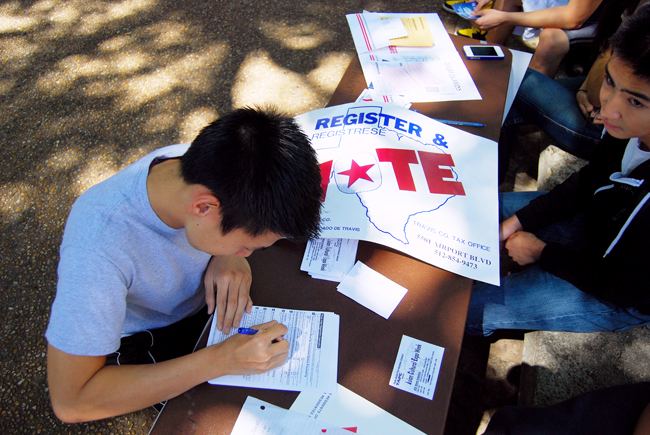Editor's note: This story is the second in a series exploring race, racism and diversity on the UT campus.
Biology senior Candrea McMillian came to UT a few years ago without any friends or family, but wasn’t worried about finding a new home within the campus community.
She had been waiting her entire life to pledge with Alpha Kappa Alpha, an African-American sorority under the National Panhellenic Council for African-American Greek organizations. McMillian said she saw the sisterhood of the organization when her mother, also an AKA, was diagnosed with multiple sclerosis, an autoimmune disease that affects the central nervous system. Her mother’s sorority sisters often picked McMillian up from day care while her mother battled the illness.
Growing up, McMillian said she knew AKA sisters become lifelong friends because of her experiences in these situations.
“I have real sisters,” said McMillian, who is NPHC parliamentarian of the council. “It’s a special organization to take part in, and you know [it is] while you’re there. Even if they don’t know you, they love you, because we have a special connection and bond that is hard to explain.”
There are six NPHC Greek organizations on campus with about 75 members all together, McMillian said, but sororities and fraternities based on culture do not only exist under one council. The Latino Panhellenic Council was created in 2000 and has seven Greek organizations on campus with about 200 members all together. There are seven sororities and fraternities with about 250 people all together under Texas Asian Panhellenic Council, which was started in 2000. Each of these three ethnicities has its own sorority and fraternity under Panhellenic councils where they can meet others with similar backgrounds and perform community services and projects focused in those areas.
McMillian said NPHC’s history makes it unique. It started in 1930, a time when African-Americans were fighting for many rights and were privileged to be in college, she said. McMillian said African-American guest speakers are brought in throughout the year and multiple services and projects are done to help the African-American population. Today a major factor that sets NPHC organizations apart from others is stepping, a rhythmic dance movement, according to McMillian. She said each sorority and fraternity has its own individual trademark of stepping, but the fact they all do it unifies them.
“For example, Alpha Kappa Alphas are stereotypically sassy and prissy,” she said. “Their colors are pink and green and they step in heels. They’re the pretty girls. Alpha Phi Alpha is very traditional in the way they step. Their colors are black and gold, and they go back to the roots. Everyone is different, and we all know the trademarks.”
Ricardo Ventura, Latino Panhellenic Council vice president and communication studies junior said NPHC sorority and fraternity members are not the only students on campus who care about cultural traditions, as the LPHC strives to cultivate tradition among members and on campus as a whole. Ventura said one of the biggest events of the year for Latino Greek organizations is Día de los Muertos, held annually in October. He said the Latino fraternities and Latina sororities collaborate with other organizations to put on a parade from the West Mall to Gregory Plaza, where face painting, food and games are set up.
“Many of us practiced the holiday in our homes and we want to educate others about its true meaning,” Ventura said. “It’s not just about dead people; it’s about celebrating life.”
Ventura said giving back to the Latino population is also one of his fraternity’s traditions, including a project where they helped teach low-income Latino families about the importance of technology by serving as translators for Dell. Each family received a free laptop at the end of the event, Ventura said.
“Coming into college, I didn’t know many people and didn’t know anything about Greek life,” Ventura said. “I loved the way the LPHC fraternities approached me, because they are so professional and true gentlemen, which I think is pretty unique to us. I fit right in with them and love educating others about our culture.”
Texas Asian Panhellenic Council president Hannah Wu, a marketing and English senior, said as an Asian-American student entering UT, she also sought an organization that would allow her to explore her culture while making friends.
“Asian sororities and fraternities are just another way to offer a home here at UT,” Wu said. “A lot of our members wouldn’t find the same type of communities and homes outside of their Asian fraternity or sorority. It’s important to provide that home base.”
Wu said the Asian population at UT is growing and the most recent Greek organization added to the TAPC was accepted only last year. She said having these fraternities and sororities is important to help the growing population feel comfortable on campus. Wu said many members of TAPC are first-generation Asian-Americans trying to balance the two cultures.
“How do you define being Asian-American?” Wu said. “That is something that we struggle with. I see myself as an American, but I also know that I am an Asian-American, too.”
As part of discovering their culture and educating others, TAPC set up a voter registration table for the upcoming presidential elections in West Campus on April 16 and 17. Everyone was welcome to register, but there was a focus on increasing the number of Asian-Americans involved in elections, said Darius Byramji, TAPC member and business senior.
“We learned that a large number of Asian-Americans who are eligible to vote are not registered,” Byramji said. “We want to change that. We can have a voice, and it’s not even hard to do.”
Printed on Thursday, April 26, 2012 as: Greek life unifies minorities





















